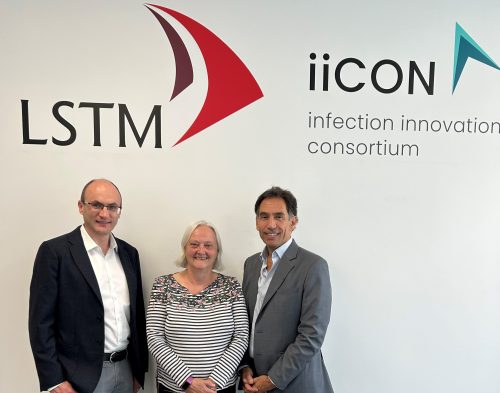School of Tropical Medicine to launch fund to tackle infectious disease research

The Liverpool School of Tropical Medicine (LSTM) has entered into a partnership with the self-funded charitable medical research organisation, LifeArc, which will join the LSTM-led Infection Innovation Consortium: iiCON and establish a £2.7m Translational Development Fund.
The partnership will create opportunities for businesses, researchers and clinicians working on treatments and diagnostic technologies to help tackle growing threats to health across the globe, including neglected tropical diseases and emerging viral threats.
The project was described by Northern Disruptors award winner Professor Janet Hemingway as a way to “connect the dots” between different parts of the life sciences sector to develop the best ideas.
Hemingway, the founding director of the Infection Innovation Consortium: iiCON, said: “Working with LifeArc to create a new platform focused on antibody humanisation marks an exciting milestone for both iiCON and for the development of tomorrow’s medical therapies. Our approaches to infectious disease research, prevention, and control are very closely aligned and we’re looking forward to seeing the vital breakthroughs that this collaboration will progress.

Prof Janet Hemingway
“The partnership with LifeArc underlines a core aspect of our mission at iiCON, which is to connect the dots across the health and life sciences sector to ensure that the best ideas and the newest technologies get the support they need to achieve significant, real-world results.”
Prof Hemingway was named the Overall Leader of the Year at TheBusinessDesk.com 2023 Northern Leadership Awards in March this year. She also won the Liverpool City Region Leader Award.
Partners in the iiCON consortium, a global collaborative infectious disease R&D programme established in 2020, include LifeArc, Unilever, Evotec, Liverpool University Hospitals Foundation Trust, University of Liverpool, and Infex Therapeutics.
Founded with government funding provided through UK Research and Innovation’s flagship Strength in Places Fund, the c£250 million programme brings together industry, academia, and clinicians to accelerate the discovery, development and deployment of new treatments and innovations– saving and improving millions of lives through collaborative innovation.
The COVID pandemic highlighted the impact new viruses can have on society and the new fund will support the progression of potential interventions, including diagnostics, treatments and devices.
Infectious diseases currently cause millions of deaths globally each year with the impact expected to worsen due to factors such as climate change, migration and intensive farming.
The fund will be available to LSTM and iiCON partners and their collaborators, including research organisations in low- and middle- income countries (LMICs), and will have a focus supporting interventions that are appropriately aligned with deployment and treatment of patients in LMICs.
As well as the fund investment, LifeArc which is committed to investing up to £1.3 billion by 2030 in areas of high unmet medical need, will make its antibody humanisation platform available to iiCON and its collaborators, to support the development of new potential treatments. Antibodies can trigger the immune system to help treat disease, and this platform enables promising antibodies from lab research to be modified, so that they can be used in people. LifeArc’s expertise and track record of success has helped transform the way many conditions are treated, with more than 90 antibodies humanised over the past 30 years, contributing to five licenced medicines.
LifeArc’s expertise will be made available commercially to any organisation domestically or internationally via a new platform at iiCON. This platform has been designed to provide partners and researchers in the field with streamlined access to LifeArc’s leading capabilities.
Professor David Lalloo, Director of Liverpool School of Tropical Medicine said: “This Translational Development Fund will not only help us to tackle the true diseases of poverty that impact the lives of some of the world’s poorest communities, but also allow us to prepare for the emerging threats of the future. This partnership between LSTM, LifeArc and iiCON will provide a number of significant opportunities for businesses, researchers and clinicians working in the antibody humanisation space and beyond. Facilitating access to advanced capabilities and new collaborations in this way will be a real boost to getting new therapies to market by helping overcome development obstacles and unlocking the potential of new innovations.”
Dr Mike Strange, Head of Global Health at LifeArc, said: ‘LifeArc is committed to investing over £100 million in global health, with a focus on infectious diseases, over the coming years. We are delighted that partnering with LSTM and iiCON is part of this. The consortium’s aim of accelerating the discovery and development of innovative new treatments, diagnostics, and preventative products for infectious diseases, aligns with our own global health strategy. It also mirrors the remit of LifeArc – using translational science to turn lab-based discoveries into medical breakthroughs that can be life-changing for patients.
“Our work in antibodies has had real impact for patients in other areas and we are pleased that we will also be able offer this platform and expertise to iiCON partners. We look forward to seeing what we can achieve together over the coming years.”
Liverpool School of Tropical Medicine (LSTM) is the world’s oldest centre of excellence in tropical medicine and international public health. It has been engaged in the fight against infectious, debilitating and disabling diseases since 1898 and continues that tradition today with a research portfolio over £320 million and a teaching programme attracting students from over 65 countries.
Also involved are biotech companies Evotec and Infex Therapeutics, the latter based at Alderley Park in Cheshire, who are working with LifeArc on number of innovative and ambitious programmes across iiCON’s ten specialist research platforms.








